新概念2第87课.
新概念英语第二册第87课习题答案

新概念英语第⼆册课后习题答案详解Lesson 881. c从课⽂第3-8⾏可以看出,只有选c. safest 才与课⽂内容相符,⽽其他3个选择都与课⽂内容相反,所以选c.2. b根据课⽂所描述的场景,营救⼯作正在进⾏,并且⾮常困难,营救的结果怎样?困在井⾥的⼈能否被救出?还是个未知数,所以只有b. So it is not certain that the men will be saved与课⽂内容符合,⽽其他3个都是肯定句,表⽰⼀定会,与课⽂内容不符合,所以选b3. b只有选b. ago才合乎语法,并同前⼀句含义相符合,其他3个都不合乎语法,意思也讲不通。
4. c只有c. Unless (如果不把他们尽快救到地⾯上来,他们就有可能丧⽣)才合乎语法和题⽬意思。
a. Except (除了,除……之外)是介词,后⾯不能跟从句;b. without (没有)后⾯不能跟从句,也不符合题⽬意思;d. whether (是否)不符合题⽬意思;所以只有c. Unless (除⾮,如果不) 才是正确答案。
5. c这是⼀个以It做先⾏主语的句⼦,在这种句⼦中真正的主语是后⾯的动词不定式、动名词、或名词从句。
本句只有选c. to rescue才符合语法,可以做主语。
⽽其他3个选择都是介词短语,不能做这类句⼦的真正主语,所以选c.6. a本句需要选⼀个与前⼀句的动词词组cause the roof to...含义相同的词组。
c. do it to 和d. do it 都与cause the roof to 含义不符合,意思讲不通。
b. make it to(使它)含义与cause the roof to 相同,但不符合语法,因为动词make 后⾯要求⽤不带to 的动词不定式,只有a. make it 符合题⽬意思也合乎语法,所以选a.7. b本句只有b. but for(若⽆,要不是)最合乎语法和题⽬意思。
a. except(除了,除……之外)不合乎习惯⽤法;c. If not 不合乎语法,应该是If not for 才对,d. unless(除⾮,如果不)后⾯只能跟从句,不合乎语法。
新概念第二册-87课

Inspector n. 探长,检查员
Meat inspector A customs inspector Customs 海关 An inspector of mines Inspect v. 检查,审视 She inspect her face in a mirror.
I was there on time…. 我是按时 到那儿的
I suggst (that) 提醒 ,依我看, 恐hat he is not so honest as he looks. I suggest that the car crash was not accidental.
You see 你知道,事实上(做解释 时说)
在口语中经常作为插入语,句首,句中,句尾 均可。 He was not really interested in the film,you see. My leg isn’t all right yet, you see, so I can’t climb the hill with you. You see, the thing is ,we won’t be finished before Friday.
Lesson 87 A perfect alibi
极好的不在犯罪现场的证据
commit vt. 犯罪; 犯错
He has committed a serious fault. 他犯了严重错误。 Commit suicide 自杀 Commit the murder 谋杀 答应做某事,致力于做某事 Many stars are committed to charity. 很多明星都致力于慈善事业。
新概念英语第二册第87课-A perfect alibi

新概念英语第二册第87课:A perfect alibiLesson 87 A perfect alibi极好的不在犯罪现场的证据First listen and then answer the question.听录音,然后回答以下问题。
What was wrong with the man's story?'At the time the murder was committed, I was travelling on the 8 o'clock train to London,' said the man.'Do you always catch such an early train?' asked the inspector.'Of course I do,' answered the man. 'I must be at work at 10 o'clock. My employer will confirm that I was there on time.''Would a later train get you to work on time?' asked the inspector.'I suppose it would, but I never catch a later train.''At what time did you arrive at the station?''At ten to eight. I bought a paper and waited for the train.''And you didn't notice anything unusual?''Of course not.''I suggest,' said the inspector, 'that you are not telling the truth.I suggest that you did not catch the 8 o'clock train, but that you caught the 8.25 which would still get you to work on time. You see, on the morning of the murder, the 8 o'clock train did not run at all. It broke down at Ferngreen station and was taken off the line.'参考译文“在凶杀发生的时候,我正坐在8点钟开往伦敦的火车上。
新概念英语第二册87课课文
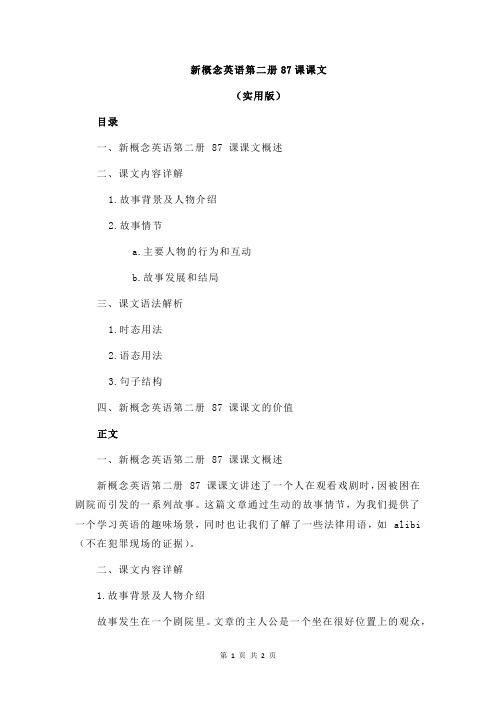
新概念英语第二册87课课文(实用版)目录一、新概念英语第二册 87 课课文概述二、课文内容详解1.故事背景及人物介绍2.故事情节a.主要人物的行为和互动b.故事发展和结局三、课文语法解析1.时态用法2.语态用法3.句子结构四、新概念英语第二册 87 课课文的价值正文一、新概念英语第二册 87 课课文概述新概念英语第二册 87 课课文讲述了一个人在观看戏剧时,因被困在剧院而引发的一系列故事。
这篇文章通过生动的故事情节,为我们提供了一个学习英语的趣味场景,同时也让我们了解了一些法律用语,如 alibi (不在犯罪现场的证据)。
二、课文内容详解1.故事背景及人物介绍故事发生在一个剧院里。
文章的主人公是一个坐在很好位置上的观众,他非常喜欢这部戏剧,但最后他却没有欣赏到戏剧的结尾。
与此同时,剧院里发生了一起谋杀案,一名男子被指控为凶手。
2.故事情节a.主要人物的行为和互动在故事中,主人公与被指控为凶手的男子进行了对话。
他们之间的对话揭示了凶手的心理活动,也让我们了解到主人公对这个案件的看法。
b.故事发展和结局随着故事的展开,我们知道了凶手实际上是一个无辜的人。
他在案发当时正在乘坐火车,有一个完美的不在犯罪现场的证据。
最后,经过调查,凶手被证明是无辜的,他被释放了。
三、课文语法解析1.时态用法课文中使用了过去时和现在时两种时态。
过去时用于描述故事发生的过程,现在时用于描述故事中人物的对话和想法。
2.语态用法课文中使用了主动语态和被动语态。
主动语态用于描述人物的行为,被动语态用于描述人物被卷入的故事情节。
3.句子结构课文中的句子结构有简单句和复合句。
简单句用于描述简单的事实,复合句用于描述复杂的情节。
四、新概念英语第二册 87 课课文的价值这篇文章通过一个有趣的故事,让我们学习到了英语的知识,同时也让我们了解到了一些法律用语。
新概念英语第二册逐句精讲语言点第87课(1)
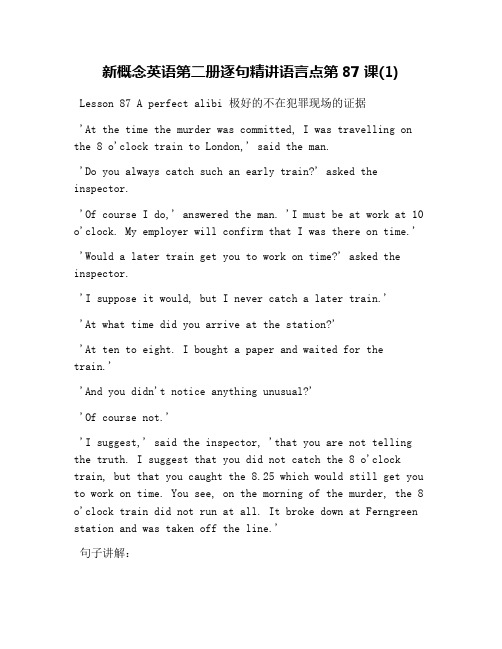
新概念英语第二册逐句精讲语言点第87课(1)Lesson 87 A perfect alibi 极好的不在犯罪现场的证据'At the time the murder was committed, I was travelling on the 8 o'clock train to London,' said the man.'Do you always catch such an early train?' asked the inspector.'Of course I do,' answered the man. 'I must be at work at 10 o'clock. My employer will confirm that I was there on time.''Would a later train get you to work on time?' asked the inspector.'I suppose it would, but I never catch a later train.''At what time did you arrive at the station?''At ten to eight. I bought a paper and waited for thetrain.''And you didn't notice anything unusual?''Of course not.''I suggest,' said the inspector, 'that you are not telling the truth. I suggest that you did not catch the 8 o'clock train, but that you caught the 8.25 which would still get you to work on time. You see, on the morning of the murder, the 8 o'clock train did not run at all. It broke down at Ferngreen station and was taken off the line.'句子讲解:1、‘At the time the murder was committed, I was travelling on the 8 o’clock train to London,,said the man.“当谋杀案发生的时候,我正生在8点钟开往伦敦的火车上呢。
新概念英语第二册第87课_A_perfect_alibi_极好的不在犯罪现场的证据

watch ,Listen and answe r
• • • • 1.What does the speedboat strike? A buoy. How is the speedboat doing? Moving in a circle.
• As the man tried to swim the speedboat round, the steering wheel came away in his waved He _______ desperately to his hands. had been water skiing companion, who ________for the last fifteen had Both had men hardly _______time to minutes. were thrown realize what was happening when they hadthe struck _________violently into sea. The continued speedboat ________a buoy, but it ________to begun move quickly across the water. Both men noticedswim toward the shore, when just ________to they _______with dismay that the speedboat straight was moving a circle. It now came _______ towards them at tremendous speed.
• 4.they swam on as quickly as they could, 他们以最快的 速度向前游去。 • on在这里是副词,表示“向前”: • Walk on along this road for ten minutes and you'll see the railway station. • 沿着这条路向前走10分钟你就会看见火车站。 • I think he saw me, but he just marched on. • 我觉得他看见了我,但他却径直往前走了。
新概念英语第二册 87课课件精编版

eg:I don’t suppose so .
eg:I don’t expect so .
★ 'At what time did you arrive at the station?‘
'At ten to eight. I bought a paper and waited for the train.‘
eg:What does the word ‘black’ suggest to yo(想法等)浮现在…….的心中. eg:An idea suggested itself to me then .
2) 提议、见议 suggest + doing suggest + sth(n.) eg:May I suggest going there by train?
inspection n. 检查、审查
undergo a medical inspection 接受健康检查
eg:They made an inspection of the factory .
★ employer
n. 雇主←→ employee
employment 就业、雇用 ←→ unemployment
3) 委婉地说、暗示 eg:Are you suggesting (that) I’m not suited for the job ?
suggestion n. 建议
suggestive adj. 富于暗示(启发) 的
suggestive comment 富于启发评论
★ truth (1) n. 真相 ←→ lie fact 真相、事实 truth 指与虚假、错误相对的事实 fact 指实际存在的客观事实 eg:My father says that truth will come out in the end .
新概念二第87课课文

新概念二第87课课文摘要:一、课文概述二、生词解析三、语法点讲解四、实用口语表达五、练习与拓展正文:一、课文概述新概念二第87课课文讲述了一个关于小明和他的朋友小华在公园里玩耍的故事。
他们在草地上踢足球,期间发生了一些趣事。
文章通过描述两人的对话,以及他们与一位老爷爷的互动,展现了他们在玩耍过程中所使用的日常英语口语。
二、生词解析1.kick:踢2.football:足球3.grass:草地4.happen:发生5.interesting:有趣的6.conversation:对话7.old:老的,年老的8.grandfather:爷爷9.polite:有礼貌的10.invite:邀请三、语法点讲解本课主要涉及到一般过去时态的运用。
一般过去时用来表示过去某个时间里发生的动作或存在的状态。
在本文中,一般过去时用来描述小明和小华在公园里玩耍的过程,以及他们与老爷爷的互动。
例如:1.They kicked the football on the grass.(他们在草地上踢足球。
)2.Interesting things happened during their conversation.(在他们对话过程中发生了一些有趣的事情。
)3.The old grandfather invited them to his house.(那位老爷爷邀请他们去他家。
)四、实用口语表达1.Let"s go outside and play.(我们去外面玩吧。
)2.Do you want to play football?(你想踢足球吗?)3.Sure, why not?(当然,为什么不呢?)4.It"s a beautiful day.(今天是个美好的一天。
)5.Nice to meet you.(很高兴认识你。
)6.Thank you.(谢谢。
)7.You"re welcome.(不客气。
新概念英语第二册87课课文

新概念英语第二册87课课文摘要:一、新概念英语第二册87 课课文概述二、课文内容详解1.故事背景及人物介绍2.故事情节a.主要人物的行为和互动b.故事发展和结局三、课文语法解析1.时态用法2.语态用法3.虚拟语气四、课文难点及对策五、新概念英语第二册87 课课文的学习建议正文:一、新概念英语第二册87 课课文概述新概念英语第二册87 课课文讲述了一个人在观看戏剧时,因为沉浸在故事情节中而错过了火车的故事。
这篇课文通过一个有趣的故事,为学习者提供了丰富的英语学习材料,包括语言表达、语法结构和词汇学习等。
二、课文内容详解1.故事背景及人物介绍故事发生在一个人观看戏剧的时候。
这个人在剧院里有一个很好的座位,戏剧也非常有趣。
然而,他在观看戏剧时错过了火车。
故事中的主要人物是观众和剧院里的演员。
观众在观看戏剧时,因为太过沉浸在故事情节中,而忘记了时间。
演员则是在舞台上表演,为观众呈现精彩的戏剧。
2.故事情节故事开始时,观众到达剧院并找到自己的座位。
他看到座位上的戏剧节目单,发现这是一部非常有趣的戏剧。
戏剧开始后,观众沉浸在故事情节中,完全忘记了时间。
当戏剧结束时,观众发现自己错过了火车。
他急忙赶到火车站,但是火车已经开走了。
他只能等待下一班火车,这让他感到非常沮丧。
三、课文语法解析1.时态用法这篇课文主要使用了过去时态,来描述故事发生的过程。
在过去时态中,动词的形式可以表示动作发生在过去某个时间。
例如:"I went to the theatre last week."(上周我去了剧院。
)2.语态用法课文中使用了主动语态和被动语态。
主动语态表示主语是动作的执行者,而被动语态表示主语是动作的承受者。
例如:"I had a very good seat."(我有一个很好的座位。
)和"The play was very interesting."(戏剧非常有趣。
新概念英语第二册87课作文范文

新概念英语第二册87课作文范文英文回答:In the quaint labyrinth of life's tapestry, we weave intricate threads that define our purpose and aspirations. Like a symphony composed of diverse instruments, our lives are a harmonious blend of experiences, each contributing to the richness of the overall melody.As we embark on this extraordinary journey, we are presented with a myriad of choices that shape our destiny. Education, a cornerstone of human progress, emerges as a beacon of enlightenment, guiding us towards a path of knowledge, empowerment, and personal fulfillment.In the realm of language acquisition, the pursuit of English proficiency has become paramount in the interconnected global community. As a language of international communication, commerce, and diplomacy, English unlocks doors to opportunities and fostersconnections beyond borders.Moreover, the study of English transcends merelinguistic proficiency. It encourages critical thinking, enhances our ability to articulate ideas, and broadens our cultural horizons. Through literature, we delve into the depths of human imagination, exploring the complexities of life, love, and loss.History unfolds before our eyes as we immerse ourselves in the written chronicles of past civilizations. Science unveils the mysteries of the natural world, empowering us with an understanding of our place within the cosmos.However, the pursuit of English fluency is not without its challenges. The journey may be arduous, marked by moments of frustration and self-doubt. Yet, with perseverance, unwavering determination, and a supportive community, these obstacles can be surmounted.Effective language learning requires a multifaceted approach. Immersion in the target language through reading,listening, speaking, and writing is essential. Engage in conversations with native speakers, participate in language exchange programs, and immerse yourself in authentic English-speaking environments.Furthermore, the adoption of a growth mindset is crucial. Embrace mistakes as opportunities for growth and seek feedback from others to refine your linguistic abilities. Constant practice and regular exposure to the language will gradually cultivate fluency and confidence.As you progress on this linguistic adventure, you will discover the profound impact that English can have on your life. It will empower you to communicate effectively, forge meaningful connections, and embrace global opportunities. It will also enhance your cognitive abilities, broaden your perspectives, and foster a lifelong love of learning.中文回答:在生命这幅错综复杂的挂毯上,我们编织着复杂的线,定义着我们的目的和愿望。
新概念英语第二册笔记-第87课
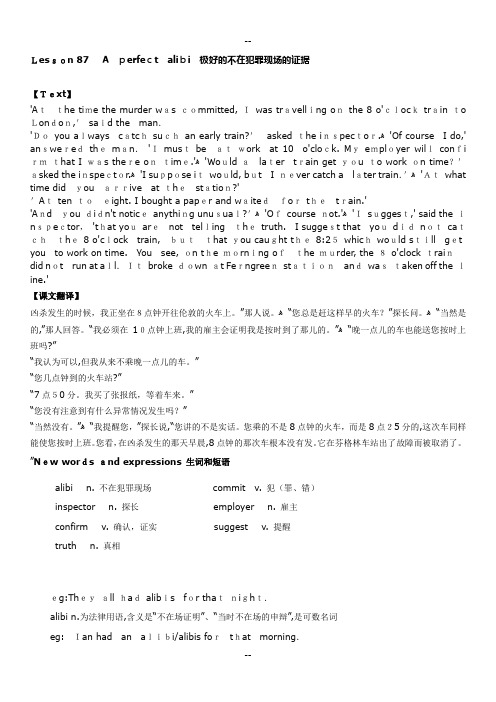
Lesson 87Aperfect alibi 极好的不在犯罪现场的证据【Text】'Atthe time the murder was committed, Iwas travelling onthe 8 o'clocktrain to London,'said the man.'Doyou always catchsuchan early train?'asked the inspector.ﻫ'Of course I do,' answeredtheman.'Imustbeatwork at 10o'clock. Myemployer willconfi rmthat I was there ontime.'ﻫ'Would alater train get you to work on time?'asked the inspector.ﻫ'I suppose itwould, but I never catch a later train.'ﻫ'Atwhat time didyouarrive at thestation?''Atten toeight. I bought a paper and waitedforthetrain.''Andyou didn't noticeanything unusual?'ﻫ'Ofcourse not.'ﻫ'Isuggest,' said the inspector,'that youarenot tellingthetruth.I suggest that youdidnotcatchthe8 o'clock train,butthat you caught the8:25whichwould still get you to work on time.You see, on the morning ofthe murder, the 8o'clock traindid not run at all.Itbroke down at Ferngreenstationandwastaken off the line.'【课文翻译】凶杀发生的时候,我正坐在8点钟开往伦敦的火车上。
新概念第二册87课摘要写作参考答案

新概念第⼆册87课摘要写作参考答案新概念第⼆册87课摘要写作参考答案The Answer to Summary writing of NEC Book Two Lesson 87The first answer(第⼀篇答案作者许⾦杰2007.03.29)At the time of murder, the man claimed that he was traveling on the 8 o'clock train to London. He arrived there on time to work. When the inspector asked whether a later train would get him to work on time, the man agreed it would, but he said he always traveled early. The inspector suggested he was lying because the 8 o'clock train broke down that day. So the man caught the 8.25. (82 words)The second Answer(第⼆篇答案作者许⾦杰2007.03.29):When the murder was committed, the man claimed that he was traveling on the 8 o'clock train to London and arrived there on time to work. Then the inspector asked whether a later train would get him to work on time. The man agreed it would, though he said he always traveled early. In reply the inspector suggested that he was lying, as the 8 o'clock train broke down and therefore the man caught the 8.25.(82 words)。
新概念英语第二册逐句精讲:第87课 极好的不在犯罪现场的证据
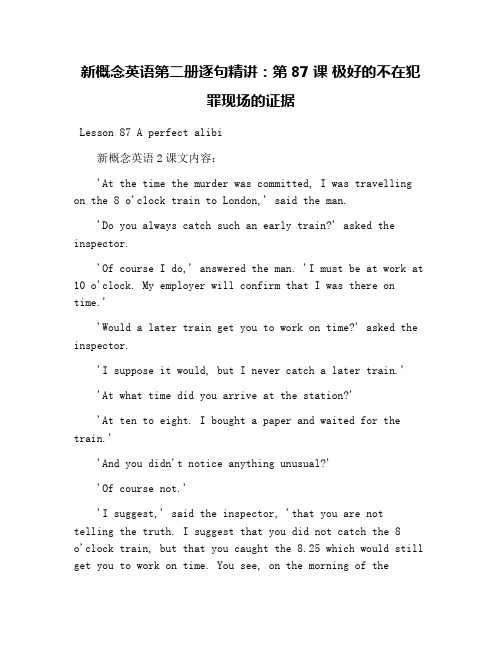
新概念英语第二册逐句精讲:第87课极好的不在犯罪现场的证据Lesson 87 A perfect alibi新概念英语2课文内容:'At the time the murder was committed, I was travelling on the 8 o'clock train to London,' said the man.'Do you always catch such an early train?' asked the inspector.'Of course I do,' answered the man. 'I must be at work at 10 o'clock. My employer will confirm that I was there on time.''Would a later train get you to work on time?' asked the inspector.'I suppose it would, but I never catch a later train.''At what time did you arrive at the station?''At ten to eight. I bought a paper and waited for the train.''And you didn't notice anything unusual?''Of course not.''I suggest,' said the inspector, 'that you are nottelling the truth. I suggest that you did not catch the 8o'clock train, but that you caught the 8.25 which would still get you to work on time. You see, on the morning of themurder, the 8 o'clock train did not run at all. It broke down at Ferngreen station and was taken off the line.'新概念英语2句子讲解:1、‘At the time the murder was committed, I wastravelling on the 8 o’clock train to London,said the man.“当谋杀案发生的时候,我正生在8点钟开往伦敦的火车上呢。
新概念英语第二册87课作文范文

新概念英语第二册87课作文范文English:In Lesson 87 of New Concept English Book Two, a British collier named Robert Oliver tells how he saved two boys from drowning in a canal. He was the only one near them when he heard a splash, prompting him to jump into the water and rescue the boys. Despite his exhaustion, Robert managed to pull them out of the water and save their lives. This heroic act not only saved the boys but also earned him recognition and praise from the community. Robert's selfless actions demonstrate the importance of being prepared to help others in times of need, even at the risk of one's own safety.Chinese:在新概念英语第二册第87课中,一位名叫罗伯特·奥利弗的英国煤矿工人讲述了他是如何在一条运河中救起了两个溺水男孩。
当时,只有他一个人在附近,他听到了一个水花声,促使他跳入水中救出了那两个男孩。
尽管他筋疲力尽,罗伯特还是成功将他们从水中拉了出来,拯救了他们的生命。
这种英勇行为不仅拯救了男孩们,还赢得了他在社区中的认可和赞扬。
罗伯特无私的行为展示了在他人需要帮助的时候,即使有危险也要做好准备去帮助他人的重要性。
新概念英语第二册87课课后习题详细答案
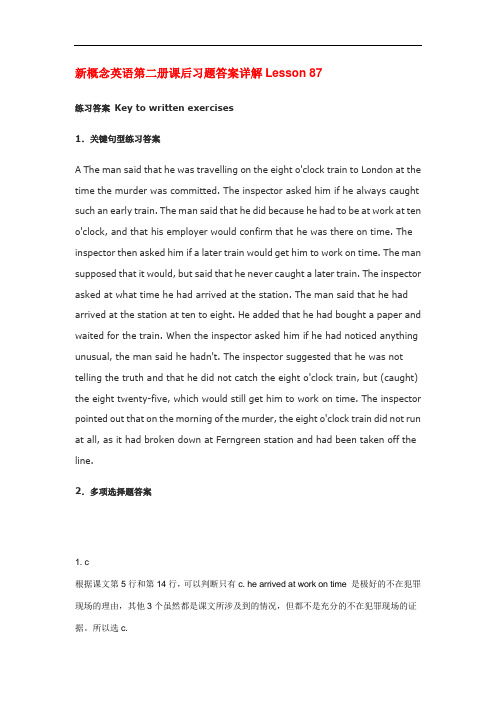
新概念英语第二册课后习题答案详解Lesson 87练习答案Key to written exercises1.关键句型练习答案A The man said that he was travelling on the eight o'clock train to London at the time the murder was committed. The inspector asked him if he always caught such an early train. The man said that he did because he had to be at work at ten o'clock, and that his employer would confirm that he was there on time. The inspector then asked him if a later train would get him to work on time. The man supposed that it would, but said that he never caught a later train. The inspector asked at what time he had arrived at the station. The man said that he had arrived at the station at ten to eight. He added that he had bought a paper and waited for the train. When the inspector asked him if he had noticed anything unusual, the man said he hadn't. The inspector suggested that he was not telling the truth and that he did not catch the eight o'clock train, but (caught) the eight twenty-five, which would still get him to work on time. The inspector pointed out that on the morning of the murder, the eight o'clock train did not run at all, as it had broken down at Ferngreen station and had been taken off the line.2.多项选择题答案1. c根据课文第5行和第14行,可以判断只有c. he arrived at work on time 是极好的不在犯罪现场的理由,其他3个虽然都是课文所涉及到的情况,但都不是充分的不在犯罪现场的证据。
新概念英语第二册第87课-A-perfect-alibi

新概念英语第二册第87课:A perfect alibi Lesson 87 自学导读First things first课文详注 Further notes on the text1.A perfect alibi,〔标题〕极好的不在犯罪现场的证据。
alibi为法律用语,含义是“不在场证明”、“当时不在场的申辩”,是可数名词:Ian had an alibi/alibis for that morning.伊恩有那天上午不在场的证据/证明。
与它搭配的动词通常有offer,prove,set up等。
2.I was there on time.我是按时到了那儿的。
on time为固定短语,表示“准时”、“按时”〔留意它与in time 的区分〕:Can you arrive on time?你能准时到吗?Tom is never on time. He always keeps other people waiting.汤姆从来不准时。
他总是让别人等。
3.And you didnt notice anything unusual? 您没有留意到有什么异样状况发生吗?这是一个陈述疑问句,即它具备与陈述句同样的基本语法结构,但用升调提问。
这种句子在英语中不常用:Youre out of work?你失业了吗?Yes,Im afraid I am.是的,恐怕是这样。
不定代词如anything,something等被形容词修饰时,形容词必需跟在不定代词之后:This is something special.这很特殊。
This isnt anything important.这并不重要。
Id like something cheaper.我想买点较为廉价的东西。
4.I suggestthat you are not telling the truth. 我提示您您讲的不是实话。
I suggest〔that〕在这里用于提出质疑,译为“依我看”、“恐怕”:I suggest that he is not so honest as he looks.依我看他并不像他看上去那么老实。
新概念英语第二册87课

full employment 充分就业
eg:We’ve in the employment of the company .
employ (1) v. 聘请、雇用 employ sb as 雇用某人…….. eg:The firm employs two interpreters * interpreter [inˈtə:pritə] n.译员;解释者;翻译器 eg:He employed the girl as a typist .
3) 委婉地说、暗示 eg:Are you suggesting (that) I’m not suited for the job ?
suggestion n. 建议
suggestive adj. 富于暗示(启发) 的
suggestive comment 富于启发评论
★ truth (1) n. 真相 ←→ lie fact 真相、事实 truth 指与虚假、错误相对的事实 fact 指实际存在的客观事实 eg:My father says that truth will come out in the end .
Lesson 87 A Perfect Alibi
真実はいつも一つ!
【New words and expressions】 alibi n. 不在犯罪现场 commit v. 犯(罪、错) inspector n. 探长 employer n. 雇主 confirm vn. 真相
(2) 使用 (物、能力)(use ) eg:You should employ your finds more wisely .
employ English as a common language 以英语作为官方语言
新概念英语第二册87课作文范文

新概念英语第二册87课作文范文Title: A Day in the Life of a Committed Individual.In the hustle and bustle of modern life, it is easy to lose sight of our values and commitments. However, there are those who, despite the challenges and temptations, remain true to their word and responsibilities. Such was the case with Mr. Smith, a committed individual whose day was filled with activities that reflected his unwavering dedication to his work and family.Mr. Smith woke up early, as was his habit, to begin his day with a cup of coffee and a newspaper. He enjoyed the quiet morning moments, reading about the world's news and events while sipping his coffee. This brief period of solitude set the tone for the rest of his day, preparing him for the challenges that awaited him.After breakfast, Mr. Smith donned his work attire and made his way to the station. The train ride to work wasalways a moment of reflection for him, as he observed the lives of the people around him. He noted the busy commuters, the students rushing to class, and the elderly enjoyingtheir retirement. Each face and situation reminded him of the importance of his own commitments and responsibilities.Arriving at the office, Mr. Smith immediately delvedinto his work. He was a diligent employee, known for his punctuality and dedication. He believed that success wasnot just about the outcomes but also about the process and the effort put in to achieve those outcomes. His colleagues respected him for his work ethic and his ability to stay focused even in the face of distractions.Midway through the day, Mr. Smith took a break to have lunch with his colleagues. They discussed various topics, ranging from work-related issues to personal interests.This break provided him with an opportunity to unwind and refresh his mind, making him more productive and efficientin the afternoon.After lunch, Mr. Smith returned to his desk, determinedto finish the pending tasks. He knew that in order to meet his commitments, he had to work hard and smart. He used his problem-solving skills to tackle the challenges at hand, ensuring that each task was completed to the best of his abilities.As the day drew to a close, Mr. Smith reviewed his work and made sure that everything was in order. He then made his way back to the station, taking the same train that had brought him to work in the morning. The evening ride was a time for him to reflect on his day and plan for the next one.Once home, Mr. Smith spent some quality time with his family, sharing stories and experiences from his day. He valued the time he spent with his loved ones, knowing that it was crucial for maintaining a healthy work-life balance. After dinner, he helped his children with their homework and played with them for a while before retiring to bed.As he lay in bed, Mr. Smith thought about the day he had just had and the days that lay ahead. He knew thattomorrow would bring new challenges and opportunities, but he was ready to face them with the same dedication and commitment that had guided him through today. He closed his eyes, grateful for the day that had been, and drifted into a peaceful sleep.Mr. Smith's story is a testament to the power of commitment and dedication. In a world that often demands more and expects less, he stood as a beacon of hope and inspiration, showing us that it is possible to lead a fulfilling life filled with meaning and purpose. His example reminds us that true success is not measured by the number of hours we work or the amount of money we earn, but by the quality of our commitments and the impact we make in the lives of others.。
- 1、下载文档前请自行甄别文档内容的完整性,平台不提供额外的编辑、内容补充、找答案等附加服务。
- 2、"仅部分预览"的文档,不可在线预览部分如存在完整性等问题,可反馈申请退款(可完整预览的文档不适用该条件!)。
- 3、如文档侵犯您的权益,请联系客服反馈,我们会尽快为您处理(人工客服工作时间:9:00-18:30)。
At the time of the murder, the man claimed that he had been travellk train to London and had arrived at work on time. When the inspector asked if a later train would get him to work on time, the man agreed it would but said that he always travelled early. The inspector suggested that he was lying because, that morning, the 8 o'clock train broke down, so the man must have caught the 8.25.
他告诉我,公司支付不起这么庞大的工资开支。 He asked if Mr. Gilbert's operation had been successful. 他问吉尔伯特先生的手术是否成功。
4)表示命令、请求、建议的祈使句
a. 动词后跟不定式
常用的这类动词有advise, ask, tell, order, command, warn, invite...
n. 不在犯罪现场
= set up an alibi
提出不在犯罪现场的辩护
prove an alibi
他有案发时不在现场的充分证据 He has a perfect alibi. 他们都有那天晚上不在现场的证明 They all had alibis for that night .
employer n. 雇主 ←→ employee employment 就业、雇用 ←→ unemployment employ v. 聘请、雇用 该公司雇用两名翻译。 The firm employs two interpreters . employ sb. as 雇用某人…….. 他雇一个女孩当打字员。 He employed the girl as a typist .
1. Can he wait a few minutes longer? (I wonder if…) I wonder if he can wait a few minutes longer. 2. When will he arrive? ( I wonder when…) I wonder when he will arrive. 3. Has he passed his examination? I wonder whether examination. he has passed his
She suggested that we (should) have lunch at the new restaurant.
2) 暗示;提醒
你的意思暗示我不适合这份工作。
Are you suggesting (that) I’m not suitable for the job ?
truth
(1)n. 真相 → lie truth 指与虚假、错误相对的事实 fact 指实际存在的客观事实
confirm
v. 确认,证实
confirm sth 他证实那谣言是真的。 He confirmed the rumor. confirm (that) 确定某事物 The president conformed (that) he would visit France the following month.
such an early train → so early a train
1.get sb. to do sth. 使做…,说服...(使役动词) 'Ofsth. course I do,' answered the man. 'I get done 使某事被做 must be at work at 10 o'clock. My employer will confirm that I was there on time.' 'Would a later train get you to work on time?' asked the inspector. in time 及时 我会说服他去做这份工作I’ll get him to do the work. at times有时 2.on 准时 你不会让她同意的。You’ll never get her time to agree .
suggest
1) 建议
suggest + doing suggest + sth.
May I suggest going there by train? He suggested another development plan to the government .
suggest that ……. 建议(虚拟语气)
3.break down 抛锚;出故障 run 可以指火车、公共汽车、船等“定时 /定期行驶, 在路上许多汽车抛锚了。 (在两地间)往来”: Many cars broke down on the way. 这个船在 Dover 和Calais 之间往来 4.take This ship off runs取消 between Dover and Calais.
‘ Turn off all the lights,’ she said. →She told me to turn off all the lights.
转述祈使句的否定形式时,必须将not放在带to的不定式之前
‘Don’t make a mess in the kitchen!’ She said. →She told / asked /warned him not to make a mess in the kitchen.
Lesson 87
A perfect alibi
alibi n. 不在犯罪现场 commit • v. 犯(罪、错) inspector • n. 探长 • employer n. 雇主 • confirm v. 确认,证实 suggest • v. 提醒
Words
• truth n. 真相
alibi
4. Where is he?
Wait for sb/sth 等待某物/某人 你在等什么 ? What are you waiting for ? 'At what time did you arrive at the station?' 'At ten to eight. I bought a paper and waited for the train.' 'And you didn't notice anything unusual?' 这是一个陈述疑问句,即它具备与陈述句同样的基本语法 结构,但用升调提问。这种句子在英语中不常用.
you see在口语中经常作为插入语出现,句首、句中或句尾均可以, 表示“你知道,事实上”等含义: 你知道,我的腿还没好呢,所以我不能和你去爬山了。 My leg isn’t all right yet, you see, so I can’t climb the hill with you.
You see, on the morning of the murder, the 8 o'clock train did not run at all. It broke down at Ferngreen station and was taken off the line.'
'At the time the murder was committed, I was travelling on the 8 o'clock train to London,' said the man.
'Do you always catch such an early train?' asked the inspector.
'Of course not.' 'I suggest,' said the inspector, 'that you are not telling the truth. I suggest that you did not catch the 8 o'clock train, but that you caught the 8.25 which would still get you to work on time.
b.suggest(建议)和insist(坚持要求)+that从句
(用should+do, should可省略) 虚拟语气
He still insisted that we should help him. He suggests that they should sell the flat.
用I wonder 来转述疑问句
'I suppose it would, but I never catch a later train.‘
suppose 认为= think = expect ——你会迟到吗?——不会 Will you be late? I don’t think so. I don’t suppose so. I don’t expect so.
Key Structure
1)陈述句:
Sb.+said/told me that...
直接引语变间接引语
2)一般疑问句: Sb.+asked me if/whether...
3)特殊疑问句: Sb.+asked me wh-/how...
